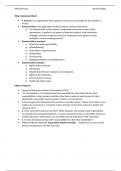Dillon Precious Business Ethics
What is Business Ethics?
A business is an organisation where goods or services are exchanged for one another or
money.
Business Ethics is the application of ethical values to business behaviour.
o It is relevant both to the conduct of individuals and to the conduct of the
organisation. It applies to all aspects of business conduct, from boardroom
strategies and how companies treat their employees and suppliers to sales
techniques, and accounting practices.
Business Ethics overview:
o Corporate social responsibility.
o Whistleblowing.
o Good ethics as good business.
o Globalization.
o Consumerism.
o Applying Kantianism and Utilitarianism.
Business Ethics includes:
o Rights of the consumer.
o Advertising.
o Relationship between employers and employees.
o Rights of the employees.
o Environmental concerns.
o Health and safety issues.
Milton Friedman:
American Nobel prize-winner for Economics (1976).
“So, the question is, do corporate executive, provided they stay within the law, have
responsibilities in their business activities other than to make as much money for their
stockholders as possible? And my answer to that is, no they do not.”
1. Do you agree that the purpose of a business is to make money? I agree to an extent, as no
matter how you look at it, a business is there to move money from someone’s pocket into
someone else’s.
2. If not, what other purposes are there? Other purposes may include social responsibility,
for example environmental protection, as many of businesses have an incredible amount of
wealth and power, which leads to an incredible scale of destruction if left untouched.
3. To who do businesses have other responsibilities to other than shareholders?
Milton Freidman called CSR “hypocritical window dressing” – simply there to cover up the
greed of companies to look like they care.
, Dillon Precious Business Ethics
Corporate Social Responsibility:
If it is true that no man is an island, the same is true of an organisation, whether it is a
business or another enterprise. As individuals we are always part of a wider community. The
same is true for a business. Businesses have responsibilities to governments, to tax
authorities, and to the wider community. CSR aims to ensure that companies conduct their
business in a way that is ethical.
Aristotle believed that the good in the individual was great but the good in the community
was the best. He believed that the polis must be bound by civil duty and “social contract.”
Cardinal Vincent Nichols:
The Archbishop of Westminster, drew on natural law and the tradition of Catholic social
teachings to commend seven principles for good business:
o 1. Human Dignity: The notion is part of the idea that we are all made in the image of
God. In secular terms it emphasises, as the Cardinal said, “each person can never be
merely an instrument valued just for their usefulness.” To say this is to involve Kant’s
second form of the Categorical Imperative. William Temple also insisted in his work
that good is always personal.
o 2. The Common Good: Nichols defines this as “the set of social conditions which
allow people more easily to develop, individually and communally.” Like Temple, he
examines the challenges of moving beyond profit as an end to the actual good of the
persons.
o 3. Solidarity: This was a major concern of Pope St John Paul II. It is the expression of
the Donne’s idea that “no man is an island.” We are all in this world, dependent on
each other; for Nichols, it means “being in touch the neds of communities, striving
for the common good particularly by looking for ways of helping underprivileged
communities.”
o 4. Subsidiarity: Formally expressed by Pope Pius XII in his encyclical Quadregesimo
Anno, published in 1931, on the fortieth anniversary Rerum Novarum. This principle
states that decisions should be made at the lowest level compatible with efficiency.
o 5. Fraternity: For Nichols, this entails fellowship towards those of distinct cultures. It
is central to building relationships, to value such as truth and honesty. In his
writings, William Temple developed the idea of “fellowship” as the social glue –
Aristotle’s idea of civic friendship, which is something deeper than whether we like
someone.
o 6. Reciprocity: The Cardinal says “…It also extends to what we call ‘fraternity’ or
‘gratuity,’ something that goes beyond duty, something that is part of charity,
properly understood. There is a basic level of justice in which we give what people
have a right to, but no more. Charity asks more of people than that. When we care
for others, we do not just give them what we must give them but go further in our
generosity. True reciprocity is a call to generosity.”
o 7. Sustainability: This stresses our duties to future generations, care for resources
and the environment.




